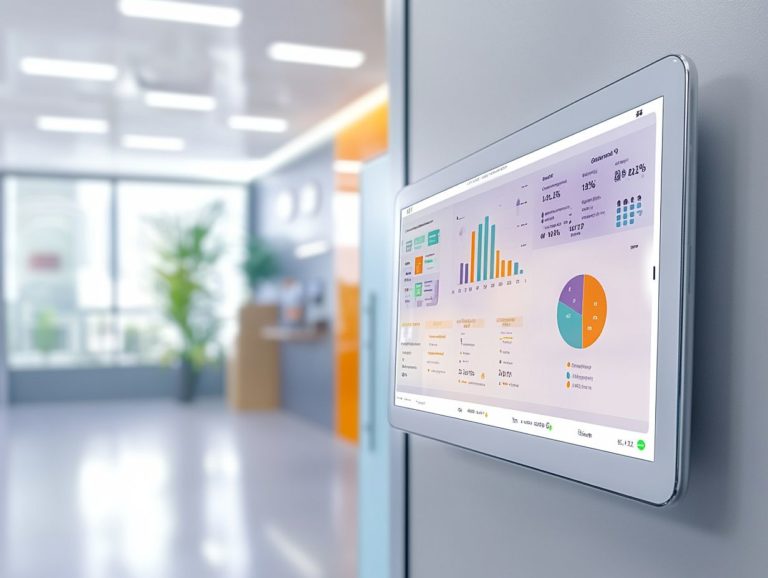96. The Role of CRM in the Music Industry
In today s fast-paced music industry, understanding and connecting with your fans is more critical than ever.
Customer Relationship Management (CRM) tools have become essential allies. They empower you and your label to elevate fan engagement, increase revenue, and refine your marketing strategies.
This article delves into the pivotal role of CRM in the music realm. You’ll explore its myriad benefits, effective implementation strategies, and inspiring success stories from the field.
You will learn about new trends that will shape the future of CRM in this ever-evolving industry.
Get ready to see how embracing CRM can completely change how you connect with your fans!
Contents
- Key Takeaways:
- Benefits of Using CRM in the Music Industry
- Implementing CRM in the Music Industry
- Case Studies of Successful CRM Implementation in the Music Industry
- Future of CRM in the Music Industry
- Frequently Asked Questions
- What is CRM and how does it relate to the music industry?
- How does CRM help with artist and fan engagement?
- What are some examples of how CRM is used in the music industry?
- How does CRM benefit record labels?
- Can independent artists also benefit from using CRM?
- What are some potential challenges or drawbacks of using CRM in the music industry?
Key Takeaways:

- CRM improves fan engagement and helps you understand your audience better.
- Using CRM can boost your revenue and create more personalized experiences for fans.
- Successful CRM implementation requires careful planning and strategic thinking.
What is CRM and How is it Used in the Music Industry?
CRM, or Customer Relationship Management, helps you connect with your fans. It enhances interactions, makes it easier to help your fans, and manages the intricacies of your relationships.
By utilizing a sophisticated CRM system, you can harness organized information and valuable customer insights. This allows you to tailor your marketing campaigns and elevate fan engagement.
This technology simplifies contact management and integrates financial data, providing you with a holistic view of your business operations. It ensures effective collaboration and communication throughout the music management ecosystem.
The significance of CRM in the music industry is paramount, enabling you to track leads, manage customer inquiries, and enhance the overall experience for your audience.
For instance, popular systems like Flowlu and Reprtoir come equipped with features that enable you to monitor ticket sales, manage event logistics, and interact directly with fans across various platforms.
These CRMs incorporate real-time analytics and social media, facilitating targeted marketing strategies that resonate with specific audiences.
By leveraging these tools, you can deepen your relationships with fans, boost engagement and loyalty, and ultimately drive revenue and brand growth.
Benefits of Using CRM in the Music Industry
Implementing a CRM system in the music industry presents a wealth of benefits that can greatly elevate your customer relationships and overall business performance.
With enhanced fan engagement and increased customer loyalty, a well-executed CRM enables you to forge deeper connections with your audience.
Moreover, it opens the door to innovative targeted marketing strategies, allowing you to optimize your marketing campaigns effectively and resonate more profoundly with your fans.
Improved Fan Engagement and Data Collection
Improved fan engagement is undoubtedly one of the most significant benefits of implementing a CRM system in the music industry. It enables you to gather invaluable customer insights with remarkable efficiency.
By analyzing audience demographics and preferences, you can tailor your offerings and engage with fans in a more personalized way, ultimately nurturing deeper connections and loyalty.
You can achieve this by tracking interactions across various platforms. This allows you to see how fans engage with your content.
For instance, by monitoring social media activity, you can pinpoint which posts resonate most with your audience.
Analyzing fan behavior through purchase patterns and event attendance gives you the insights needed to craft targeted campaigns.
Utilizing data-driven tools, such as personalized email newsletters or exclusive content offers based on past engagement, enhances your communication and fosters a sense of community.
As a result, you can build lasting relationships with your audience, making them feel valued and appreciated.
Start exploring CRM tools today and transform your music career!
Increased Revenue and Marketing Opportunities

Leveraging a Customer Relationship Management (CRM) system can boost your revenue and open new marketing doors for your music business. Precise sales tracking and effective communication with your fans set you up for success.
With financial data and analytics, you can create marketing campaigns that resonate with your audience, leading to better performance and higher profits.
This strategic approach enhances fan engagement and builds loyalty, which is crucial in today s competitive landscape.
Design targeted campaigns based on audience insights to ensure your promotions hit the right notes and achieve higher conversion rates.
Streamlining sales tracking helps you understand performance patterns, allowing you to refine your initiatives for continuous growth.
CRM technology forms the backbone of your music business, creating a flexible financial structure that adapts to your needs.
Implementing CRM in the Music Industry
Implementing a CRM system in the music industry requires a strategic approach. Consider the unique dynamics of your sector, especially the relationships among artists, fans, and stakeholders.
Assess the specific needs of your business and choose the right CRM features to enhance customer service, help your team work better together, and streamline operations.
Key Considerations and Strategies
To successfully implement CRM in music management, address key strategies for alignment with industry needs.
Set clear goals for customer relationships, train your staff on CRM tools, and ensure smooth integration with existing systems to boost workflows.
Align these strategies with your business objectives to enhance performance and drive revenue growth.
User adoption is vital; a trained team will use the CRM effectively, providing valuable customer insights and improving communication.
Integrating social media management tools within the CRM allows real-time engagement and feedback, giving you a complete view of customer interactions.
These strategies will improve your customer service and streamline operations, fostering strong relationships and satisfaction in music management.
Case Studies of Successful CRM Implementation in the Music Industry
Many case studies show how CRM systems transformed the music industry. Innovative strategies adopted by artists and labels elevate their operations.
By using CRM tools, enhance your marketing efforts, deepen fan interactions, and refine the customer experience.
These pioneering approaches set benchmarks for what s achievable when creativity meets technology.
Examples of Artists and Labels Using CRM Effectively

Many artists and labels are using CRM systems to build fan loyalty. These tools can transform marketing in the music industry.
These examples highlight how strategically employing CRM features can enhance customer feedback and engagement. A well-known indie label recently implemented a CRM platform to segment their audience based on listening habits. By tailoring outreach through this insightful data, they achieved an impressive 30% increase in attendance at live shows.
An emerging artist used similar technology to analyze social media interactions. This enabled them to craft targeted merchandise campaigns that resonated deeply with their fans.
This approach not only boosted merchandise sales but also nurtured a vibrant online community, fostering a stronger connection between the artist and their audience.
These cases illustrate that by meticulously tracking and analyzing customer data, artists and labels can create more personalized experiences, ultimately driving both fan satisfaction and business growth.
Future of CRM in the Music Industry
Get ready for exciting advancements in CRM for the music industry! The evolution of technology and changing consumer expectations will fuel these innovations.
You will witness new trends and innovations as the industry adopts digital tools and real-time analytics.
In this dynamic landscape, CRM systems will be pivotal in transforming how music professionals engage with fans and streamline their business operations.
Potential Trends and Innovations
Potential trends in CRM within the music industry will focus on elevating customer experience through advanced data analytics and machine learning. Prioritizing personalized interactions in your music business will be essential to maintaining a competitive edge.
With the rise of AI, you can analyze listener habits in real-time. This enables you to deliver tailored content and craft targeted marketing strategies.
The implementation of sophisticated data collection methods allows for a deeper understanding of audience preferences and behaviors, paving the way for more effective engagement initiatives.
Emerging tools designed to enhance customer experience will facilitate smoother communication between artists and fans, fostering a strong sense of community. For music companies aiming to thrive in a rapidly evolving landscape, staying ahead of these trends will strengthen relationships and drive long-term growth.
Frequently Asked Questions
What is CRM and how does it relate to the music industry?

CRM (Customer Relationship Management) is a software and business strategy used to manage and analyze customer interactions and data. In the music industry, CRM helps artists and record labels better understand and connect with their fans and customers.
How does CRM help with artist and fan engagement?
CRM allows artists and record labels to gather data and insights on their fans’ preferences, behaviors, and interactions. This information can then be used to create targeted marketing campaigns and personalized experiences, leading to increased engagement and loyalty from fans.
What are some examples of how CRM is used in the music industry?
Examples include using CRM to track ticket sales and attendance at concerts, analyze streaming and download data, and send personalized emails and promotions to fans. CRM can also manage artist-fan interactions on social media and track merchandise sales.
How does CRM benefit record labels?
CRM helps record labels streamline their marketing and promotional efforts while tracking and analyzing the success of their campaigns. It also allows them to better understand their audience and make data-driven decisions when signing and promoting new artists.
Stay ahead in the music industry by exploring how CRM can revolutionize your fan engagement!
Can independent artists also benefit from using CRM?
Yes, CRM (Customer Relationship Management) is not just for major record labels. Independent artists can definitely use CRM software to manage their fan base and track their audience’s preferences.
This approach helps them make informed decisions about their music and marketing strategies.
What are some potential challenges or drawbacks of using CRM in the music industry?
One potential challenge is the cost of setting up and using a CRM system. Gathering and analyzing data can also be time-consuming.
There’s a risk of misinterpreting data or relying too heavily on it instead of building personal connections with fans. Some fans may view targeted marketing and personalized experiences as intrusive or manipulative.






